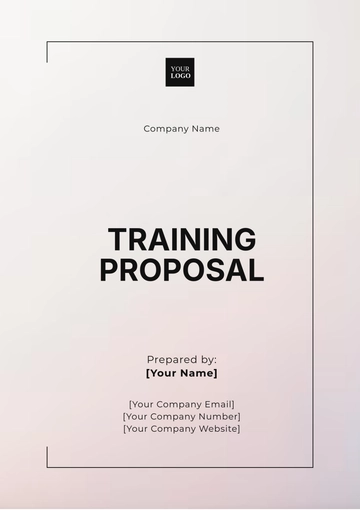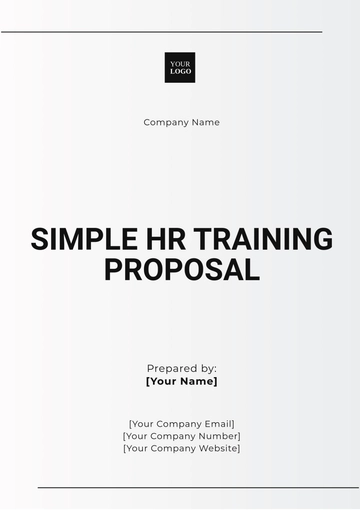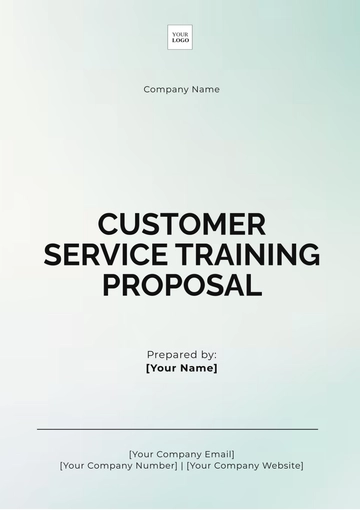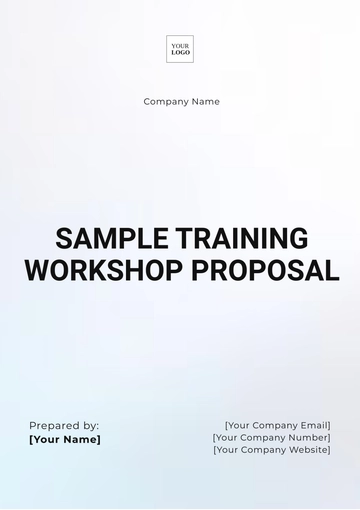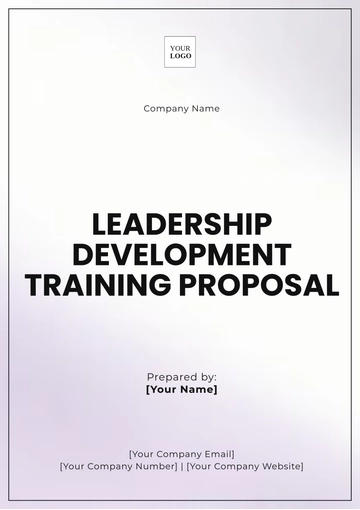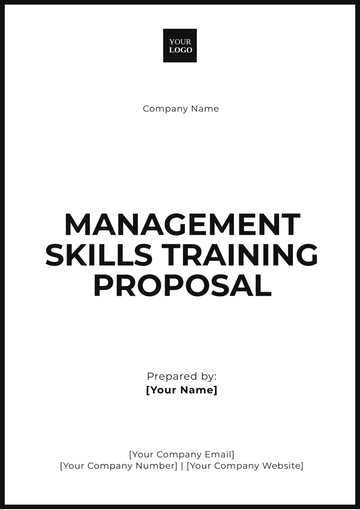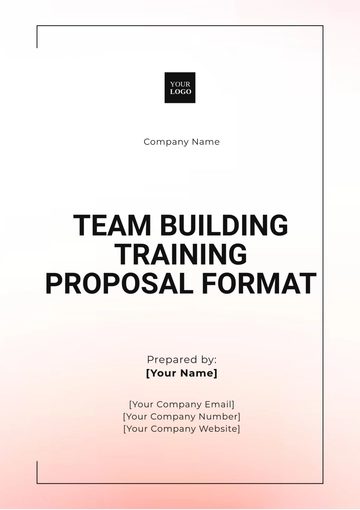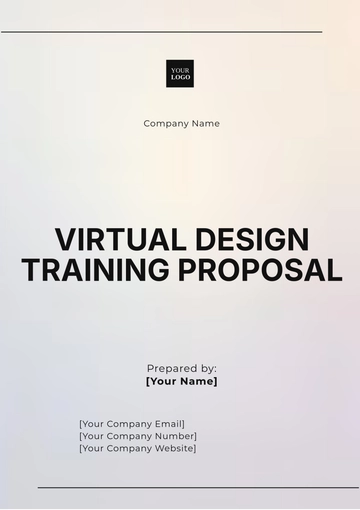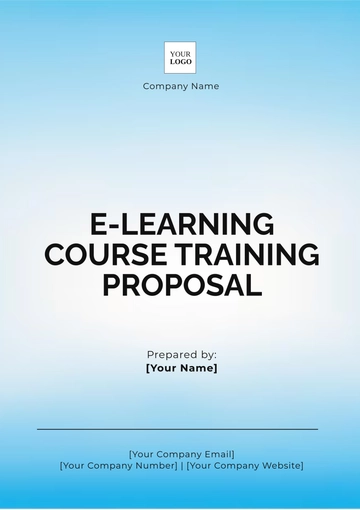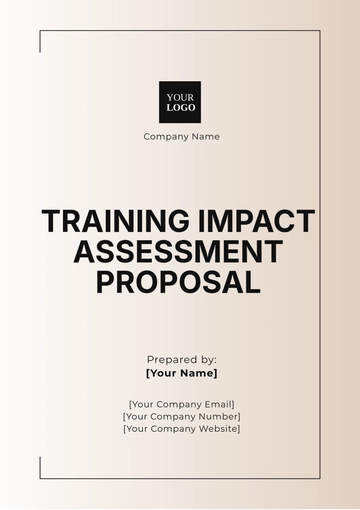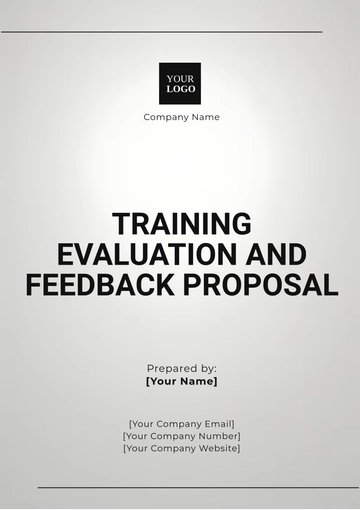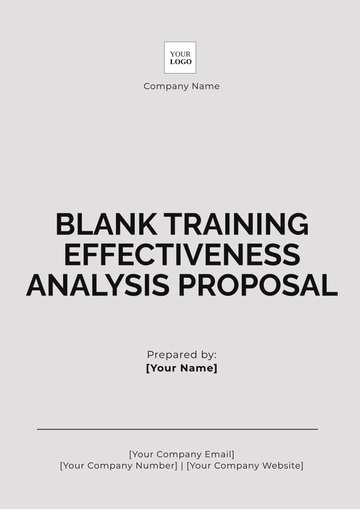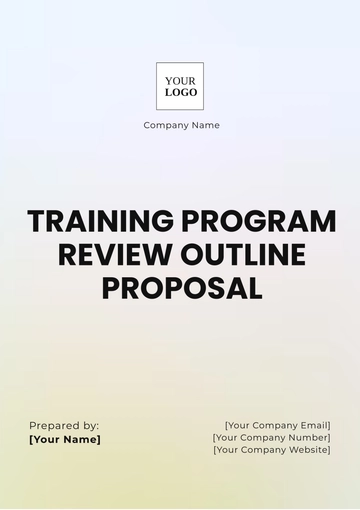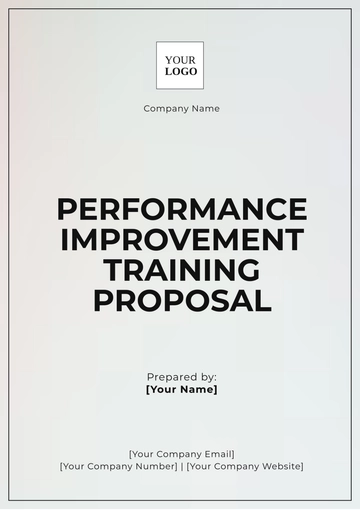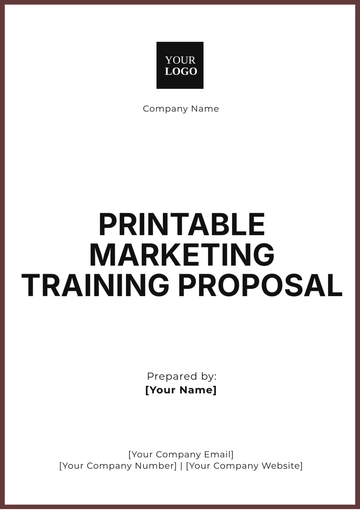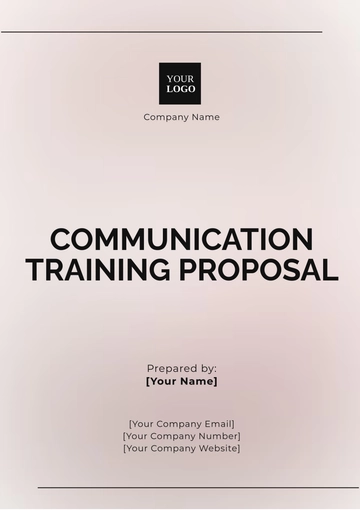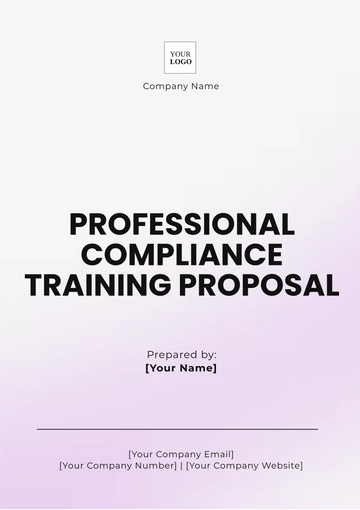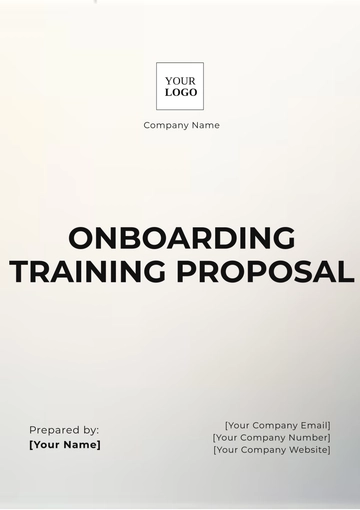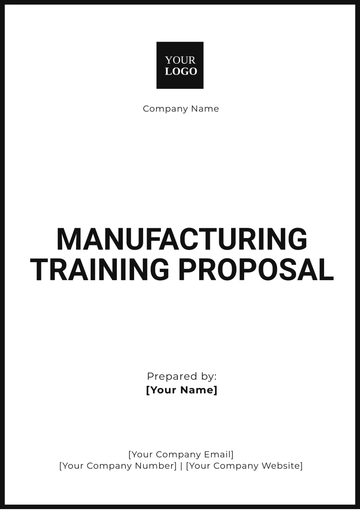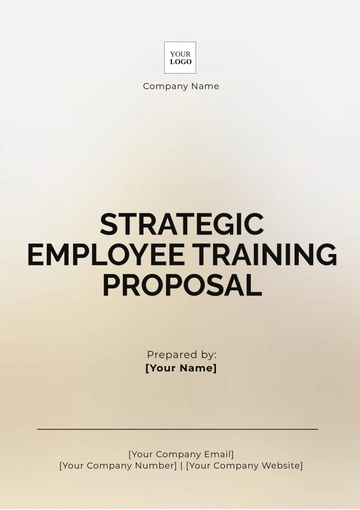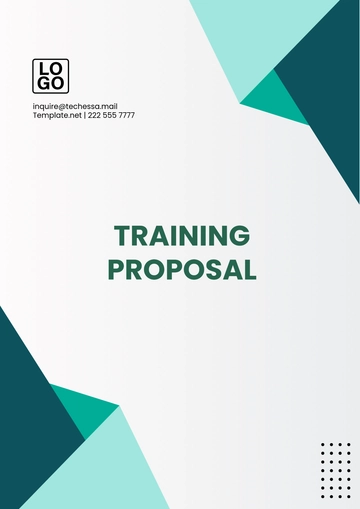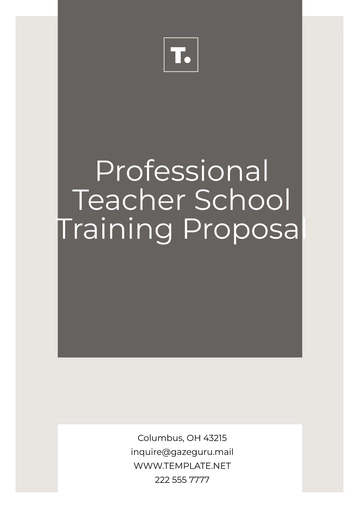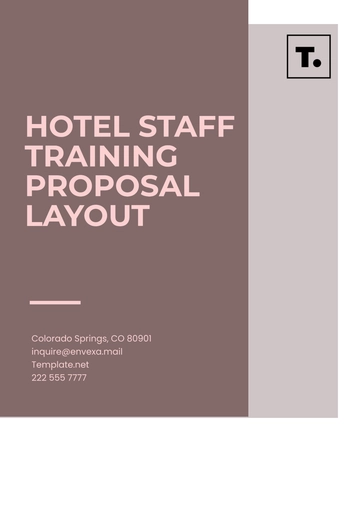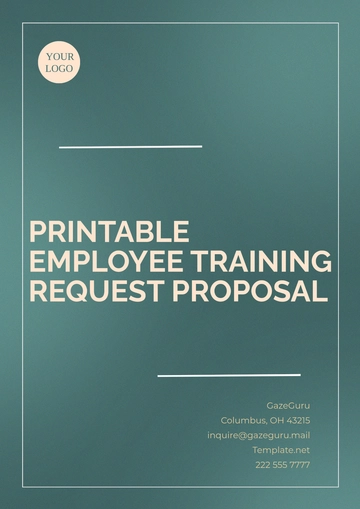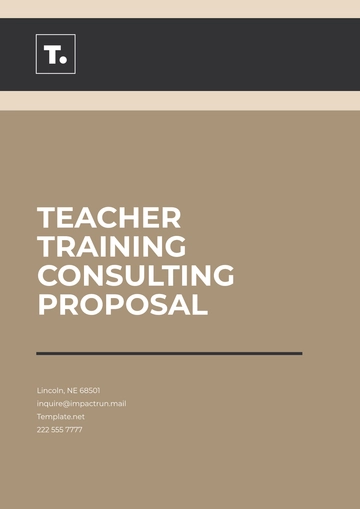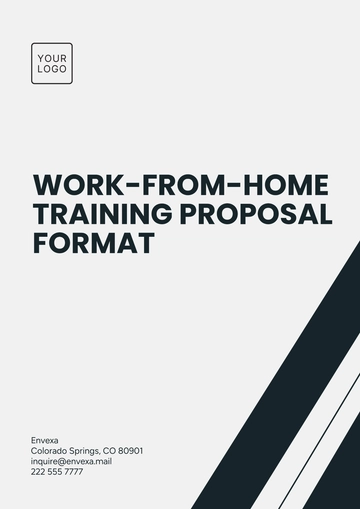Free Customer Service Training Proposal
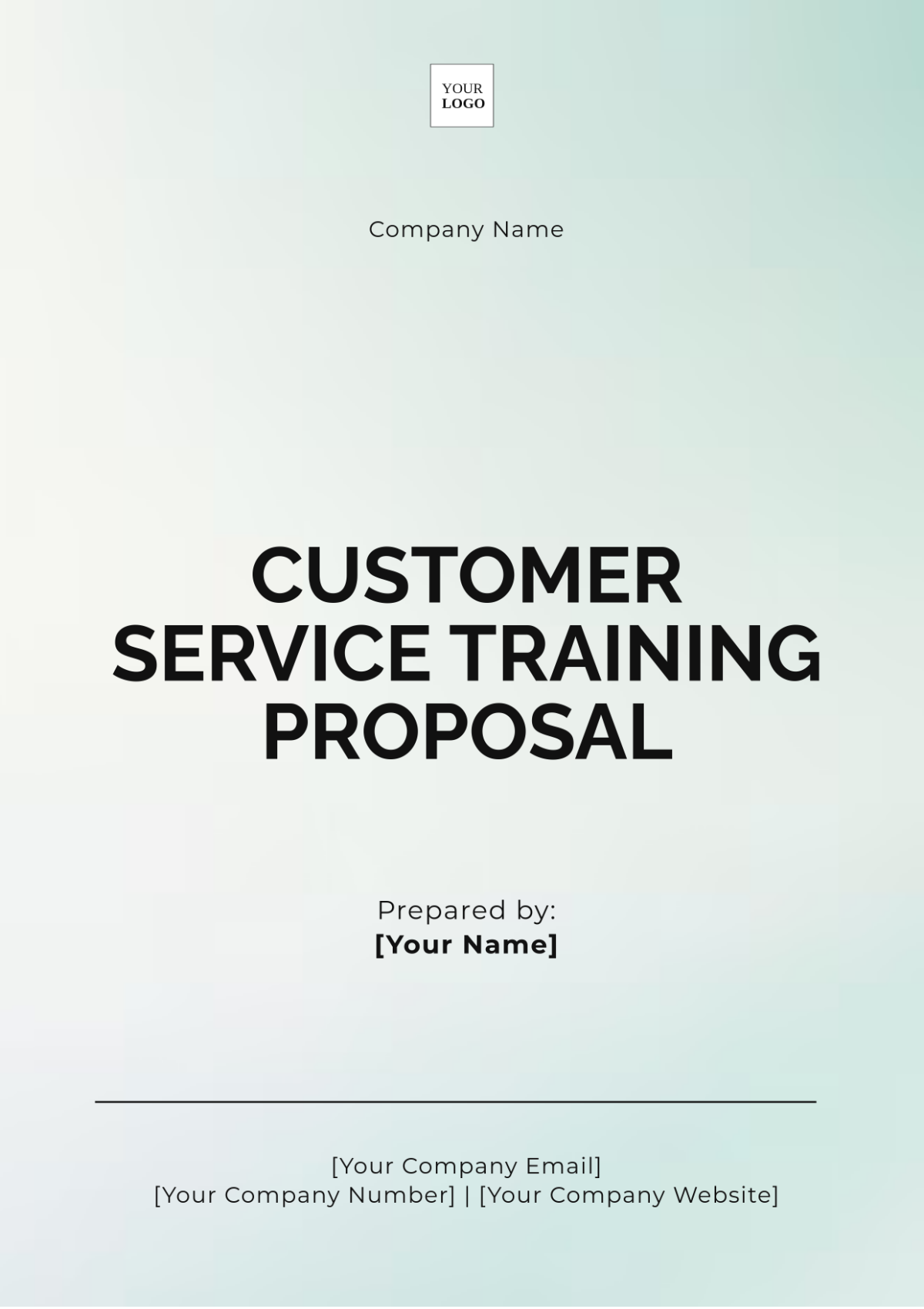
Prepared by: [Your Name]
Company: [Your Company Name]
Date: [Date]
I. Executive Summary
This Customer Service Training Proposal aims to enhance the customer service skills of our employees, ultimately leading to increased customer satisfaction, loyalty, and retention. By implementing a comprehensive training program focused on key areas such as effective communication, problem-solving, and empathy, we aim to equip our staff with the necessary tools to provide exceptional service at all customer touchpoints. This document outlines the key objectives, methodology, timeline, budget, evaluation criteria, and trainer information related to the proposed training, ensuring a structured approach to improving customer service excellence across the organization.
II. Objectives
A. Improve Communication Skills
Enhance the ability of employees to engage with customers effectively, ensuring clear, courteous, and positive communication. This objective focuses on eliminating communication barriers, improving listening skills, and ensuring that messages are conveyed understandably and professionally.
B. Enhance Problem-Solving Abilities
Equip staff with the necessary skills to identify, address, and resolve customer issues promptly and efficiently. This involves training employees to use critical thinking and creativity to handle customer complaints and inquiries effectively.
C. Foster Empathy and Customer-Centric Mindset
Encourage employees to develop a deeper understanding of customer needs and experiences. This objective promotes the adoption of a customer-first mindset, ensuring that staff consistently demonstrate empathy and show genuine concern for customer satisfaction.
D. Increase Customer Satisfaction
Ultimately, this training aims to increase overall customer satisfaction scores. By providing consistent, high-quality service, the company will enhance customer loyalty and foster long-term relationships with its clients.
III. Training Methodology
The proposed training program will incorporate a blend of interactive, hands-on learning methods to cater to diverse learning preferences, ensuring that all employees are fully engaged and able to absorb the training material effectively.
A. Workshops
Interactive workshops will be conducted, focusing on real-life customer service scenarios to help participants practice their communication and problem-solving skills in a controlled environment. These sessions will encourage active participation and hands-on learning.
B. Role-Playing
Simulated customer interactions will be used to allow employees to role-play various scenarios. This method helps staff build confidence in handling challenging customer interactions and improves their ability to apply theoretical knowledge in real-life situations.
C. Online Modules
Self-paced e-learning modules will cover both basic and advanced customer service concepts. These modules are designed to provide flexibility for employees, allowing them to learn at their own pace and revisit material as needed.
D. Group Discussions
Collaborative group discussions will enable employees to share their experiences, ideas, and strategies with their peers. This approach promotes knowledge sharing and helps build a strong team culture centered on continuous improvement.
E. Feedback and Coaching
Regular feedback sessions will be conducted, allowing employees to receive personalized coaching based on their performance during workshops and role-playing exercises. This will ensure that any areas requiring improvement are addressed through tailored guidance.
IV. Timeline
The training program is designed to be completed in 10 weeks, with each phase building upon the previous one to ensure comprehensive skill development and mastery.
Phase | Description | Timeline |
|---|---|---|
Phase 1 | Needs Assessment and Planning | Week 1-2 |
Phase 2 | Initial Training Workshops and Modules | Week 3-4 |
Phase 3 | Role-Playing and Group Discussions | Week 5-6 |
Phase 4 | Feedback, Coaching, and Evaluation | Week 7-8 |
Phase 5 | Follow-up Sessions and Final Assessment | Week 9-10 |
During the Needs Assessment and Planning phase, we will identify specific skill gaps and tailor the training to address them. The Initial Training Workshops and Modules will introduce key customer service concepts. In the Role-Playing and Group Discussions, participants will apply what they’ve learned. Feedback and Coaching will provide targeted improvements, and Follow-up Sessions will ensure long-term retention of skills.
V. Budget
The estimated budget for the complete training program is as follows:
Category | Estimated Cost |
|---|---|
Workshop Materials | $1,500 |
Online Modules | $2,000 |
Trainer Fees | $3,500 |
Venue and Equipment | $1,000 |
Miscellaneous | $500 |
Total Estimated Cost | $8,500 |
This budget covers all necessary materials, trainer fees, and venue costs for the full 10-week training program. Additional costs may arise from unforeseen requirements, which will be handled within the miscellaneous budget.
VI. Evaluation
To measure the success and effectiveness of the training program, we will use the following evaluation methods:
A. Pre- and Post-Training Assessments
Employees will complete assessments before and after the training to gauge their skill improvement in areas such as communication, problem-solving, and customer interaction.
B. Feedback Forms
Participants will fill out feedback forms to provide insights into their learning experiences and suggest improvements for future training sessions.
C. Observation of Customer Interactions
Supervisors and managers will observe employees during their interactions with customers, assessing how well they apply the skills learned during training in real-world situations.
D. Analysis of Customer Feedback and Satisfaction Scores
We will closely monitor customer feedback and satisfaction scores after the training to identify any measurable improvements in service quality.
VII. Trainer Information
The training program will be led by [Your Name], a highly experienced customer service training consultant with over 15 years of industry experience. [Your Name] has successfully implemented customer service training programs for various companies, resulting in significant improvements in customer satisfaction and employee performance. [Your Name]’s expertise includes communication strategies, conflict resolution, and customer psychology. She will be supported by a team of specialists in these fields to ensure a comprehensive and high-quality training experience.
VIII. Signatures
By signing below, both parties agree to the terms outlined in this Customer Service Training Proposal and commit to the successful execution of the training program as described.
Trainer's Signature:
[Your Name]
[Date Signed]
Manager's Signature:
Lyda Fadel
[Date Signed]
- 100% Customizable, free editor
- Access 1 Million+ Templates, photo’s & graphics
- Download or share as a template
- Click and replace photos, graphics, text, backgrounds
- Resize, crop, AI write & more
- Access advanced editor
Create comprehensive training plans with the Customer Service Training Proposal Template from Template.net. This editable and fully customizable template helps you structure and present effective customer service training programs. Ideal for businesses of all sizes, it outlines key goals and strategies for improving customer interactions. Modify it easily to suit your team’s specific needs, and it's also editable in our AI Editor Tool for quick adjustments.
You may also like
- Business Proposal
- Research Proposal
- Proposal Request
- Project Proposal
- Grant Proposal
- Photography Proposal
- Job Proposal
- Budget Proposal
- Marketing Proposal
- Branding Proposal
- Advertising Proposal
- Sales Proposal
- Startup Proposal
- Event Proposal
- Creative Proposal
- Restaurant Proposal
- Blank Proposal
- One Page Proposal
- Proposal Report
- IT Proposal
- Non Profit Proposal
- Training Proposal
- Construction Proposal
- School Proposal
- Cleaning Proposal
- Contract Proposal
- HR Proposal
- Travel Agency Proposal
- Small Business Proposal
- Investment Proposal
- Bid Proposal
- Retail Business Proposal
- Sponsorship Proposal
- Academic Proposal
- Partnership Proposal
- Work Proposal
- Agency Proposal
- University Proposal
- Accounting Proposal
- Real Estate Proposal
- Hotel Proposal
- Product Proposal
- Advertising Agency Proposal
- Development Proposal
- Loan Proposal
- Website Proposal
- Nursing Home Proposal
- Financial Proposal
- Salon Proposal
- Freelancer Proposal
- Funding Proposal
- Work from Home Proposal
- Company Proposal
- Consulting Proposal
- Educational Proposal
- Construction Bid Proposal
- Interior Design Proposal
- New Product Proposal
- Sports Proposal
- Corporate Proposal
- Food Proposal
- Property Proposal
- Maintenance Proposal
- Purchase Proposal
- Rental Proposal
- Recruitment Proposal
- Social Media Proposal
- Travel Proposal
- Trip Proposal
- Software Proposal
- Conference Proposal
- Graphic Design Proposal
- Law Firm Proposal
- Medical Proposal
- Music Proposal
- Pricing Proposal
- SEO Proposal
- Strategy Proposal
- Technical Proposal
- Coaching Proposal
- Ecommerce Proposal
- Fundraising Proposal
- Landscaping Proposal
- Charity Proposal
- Contractor Proposal
- Exhibition Proposal
- Art Proposal
- Mobile Proposal
- Equipment Proposal
- Student Proposal
- Engineering Proposal
- Business Proposal
